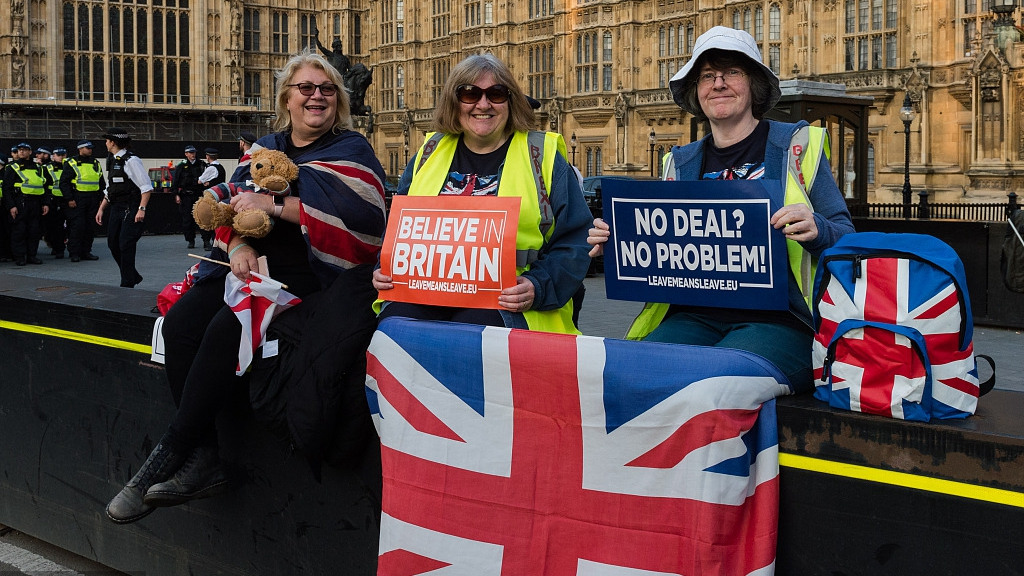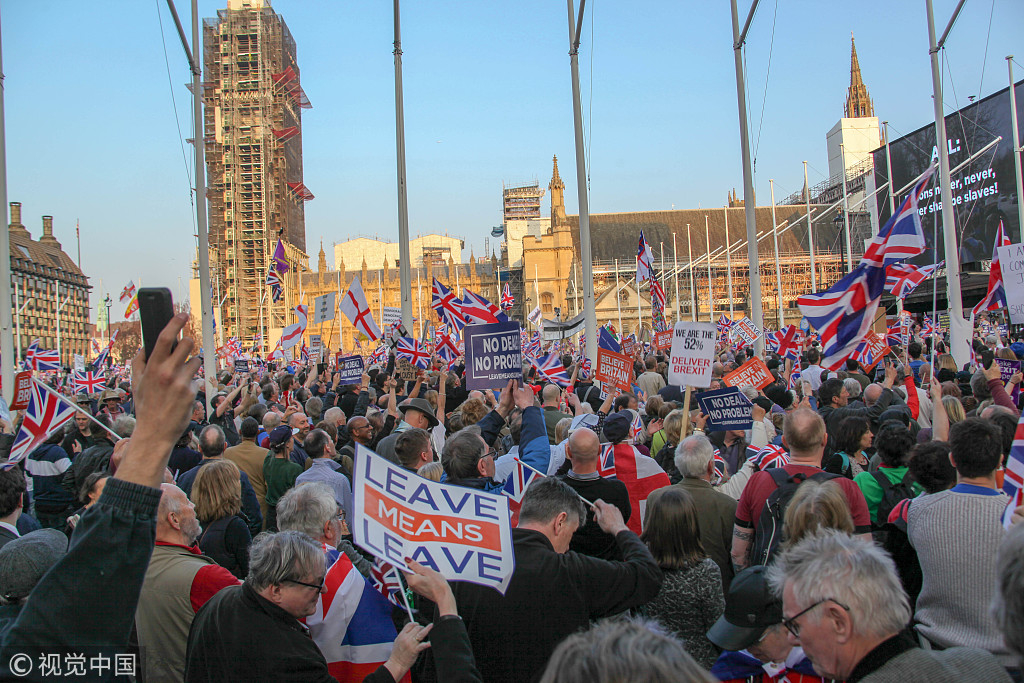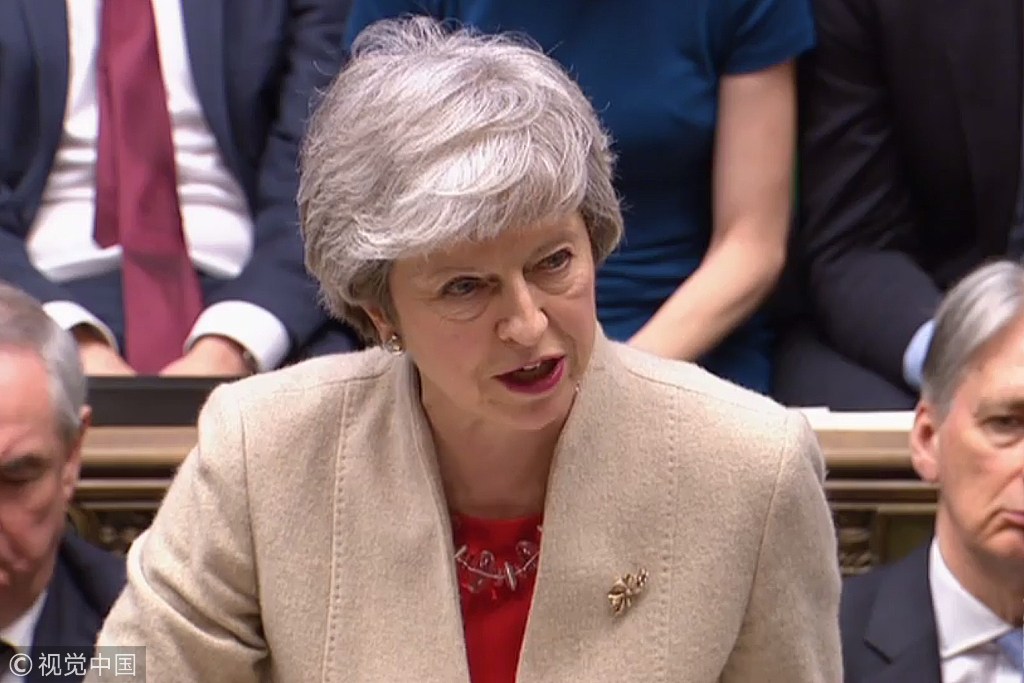
Opinion
07:56, 31-Mar-2019
Libertarian paternalism, democracy and populism in the Brexit arena
Richard Fairchild

Editor's note: Richard Fairchild is an associate professor at the School of Management at the University of Bath. The article reflects the author's opinions, and not necessarily those of CGTN.
On March 29, on the day that Britain had been originally due to leave the EU, UK Prime Minister Theresa May put her deal to the UK Parliament for the third time, and again it was hugely voted down! This means that Britain has missed an EU deadline, which may be delayed again until May 22. The prime minister now has until April 12 to try to negotiate a delay to Brexit, but analysts say that it is increasingly likely that Britain will crash out with no deal on April 12.
Indeed, EU Council leader Donald Tusk has indicated that, following the latest rejection of the deal, he will be calling an emergency meeting of the EU Council on April 10, with no-deal Brexit looking increasingly likely on April 12. He states that the EU has been preparing for the possibility of a no-deal Brexit since December 2017!
The Brexit referendum in 2016 appeared to give control of Britain's future to the British public: that, after all, is the cornerstone of democracy, giving power to the people! However, the reality since has been far different. In the chaos that has reigned since May came back from Brussels with a deal, the will of the British people seems to be forgotten, while the politicians of all persuasions play their extraordinary power games!

Pro-Brexit supporters gather in London, March 29, 2019. /VCG Photo
Pro-Brexit supporters gather in London, March 29, 2019. /VCG Photo
In 2016, the British public narrowly voted for Brexit (52 percent for Brexit, 48 percent for remain). At the time, many believed that the British voters were exercising their rights to seize control of their economic and political processes from the EU. In the repeated game-playing at Westminster, that control has been wrested from the public into the hands of the elite.
Some politicians are genuinely putting forward their beliefs in what is right for the country, but many are playing power games against May. Furthermore, there are conflicts between the political parties, and between the Brexiteers and the Remainers.
After repeatedly rejecting May's deal, this week, MPs have seized control of the process: eight alternative deals were put forward by various MPs on March 27 for MPs to vote on! The eight proposals ranged from no deal, deals involving close customs unions, other market arrangements, revoking article 50 to cancel Brexit, and having a second public referendum (which, personally, appeals to this author, in the name of democracy!). Interestingly, all of these proposals were voted down. Does this event suggest that it has always been very difficult to get a consensus of opinion behind any deal? Even the elite cannot agree!

British Prime Minister Theresa May makes a statement in the House of Commons in London, March 29, 2019. /VCG Photo
British Prime Minister Theresa May makes a statement in the House of Commons in London, March 29, 2019. /VCG Photo
Add to the mix the fiasco of May's last-ditch attempt to get her deal "over the line" by making her contradictory offer to resign if her deal is agreed, but to stay if her deal is rejected (a kind of new-style bargaining logic that would fit well in the pages of "Alice Through the Looking Glass," where topsy-turvy mirror-thinking and reverse logic were the order of the day!) it is very telling that, as soon as May made this offer, arch opponents of the deal, such as Boris Johnson and Jacob Rees -Mogg, immediately changed their stance and backed the deal. So, for those two particular gentlemen, it is not about the deal, and what is best for the British public, but it is about seizing power from May.
The EU has watched on, bemused. Jean-Claude Juncker has said that the will of the British people is shifting back towards "remain": "The British public are Europeans," he has stated. The Independent newspaper has stated that, in all of the chaos, Britain has actually lost control, far from the dreams of those referendum days in 2016.
Behavioral economists Richard Thaler and Cass Sunstein argued in 2002 for a concept that they called "libertarian paternalism." They argued that people are not always completely rational, are often psychologically flawed, emotional, prone to making mistakes and confused about what is best for them in the long-run. In this case, Thaler and Sunstein argue that it is best for a higher authority to make decisions for them or nudge them in the right direction. This would suggest that democracy is not always efficient on every issue, particularly very complex and emotive issues!
In the Brexit case, this would suggest one of two things: a) We perhaps should have not had a public referendum in the first place: libertarian paternalism would suggest that the higher authority (Parliament!) knows best what is good for us! b) But, having had the vote, we need a clear and strong paternalistic leadership to guide us to the best Brexit decision! It is clear that, in the Brexit case, libertarian paternalism will not work! Who is going to guide our leaders? Politics academic Michael Freeden provided an interesting analysis in 2017 on populism as an ideology surrounding the Brexit vote.
It is clear that when then Prime Minister David Cameron decided to put the Brexit debate to the British public in the form of the 2016 referendum, he unleashed a set of political forces that, far from giving control to the British public, have eventually put us out of control!
(If you want to contribute and have specific expertise, please contact us at opinions@cgtn.com.)

SITEMAP
Copyright © 2018 CGTN. Beijing ICP prepared NO.16065310-3
Copyright © 2018 CGTN. Beijing ICP prepared NO.16065310-3